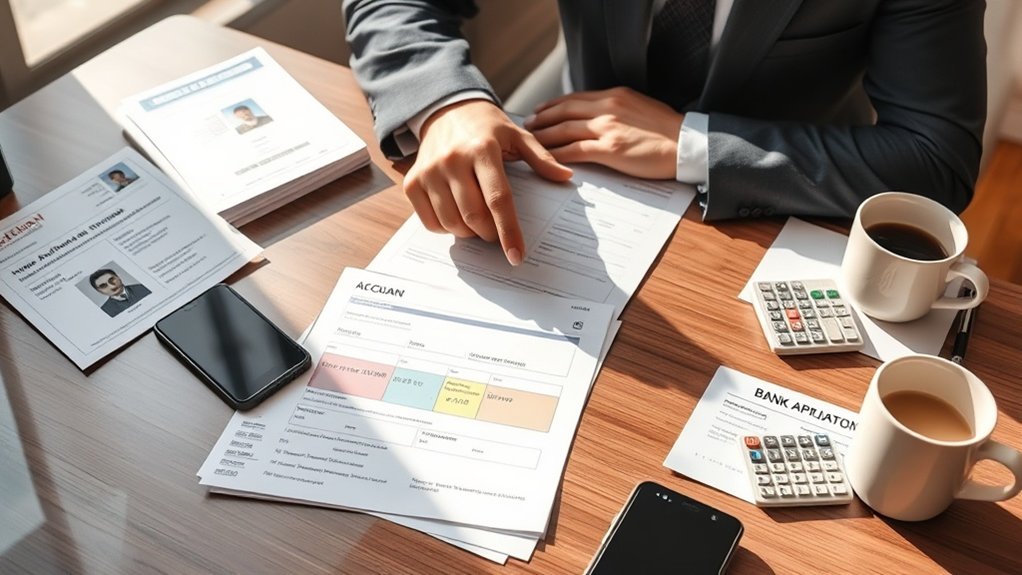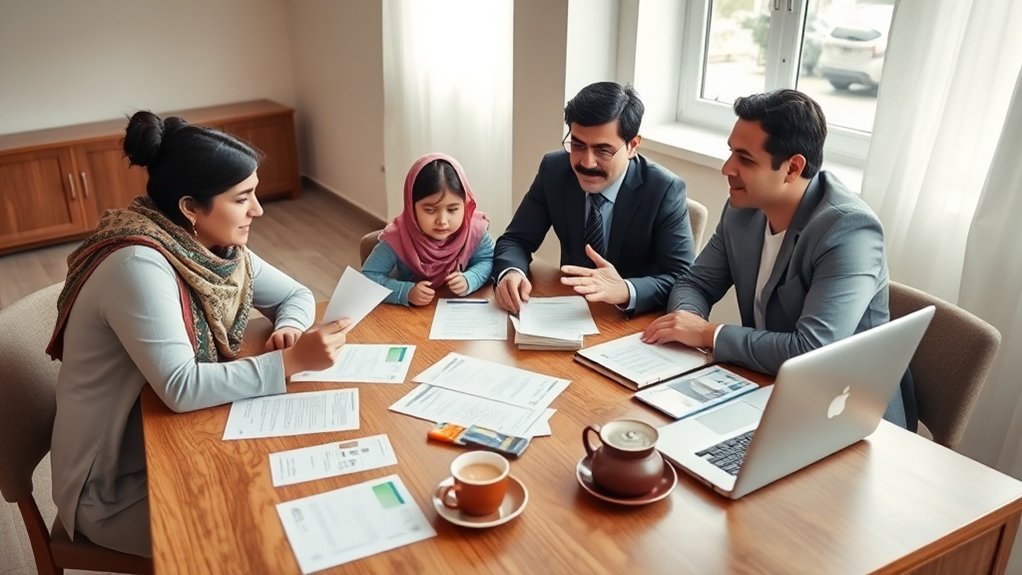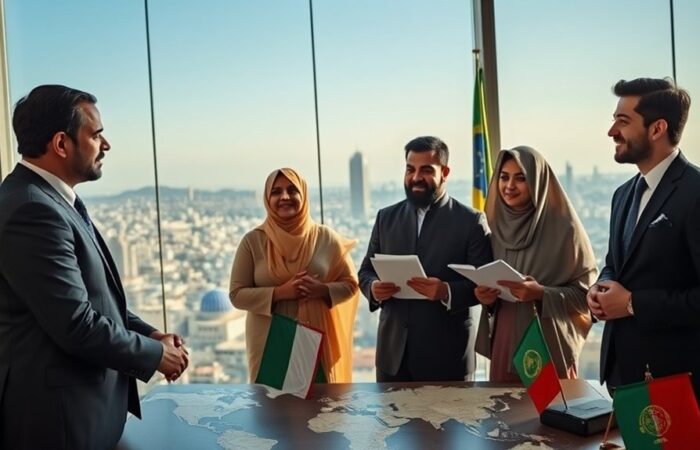When you arrive in Brazil as an Afghan refugee, handling the paperwork for utilities, banking, and public services can be overwhelming. Vieira Braga Advogados steps in to guide you through each step, ensuring you don’t miss any crucial details like getting your CPF or connecting to basic services. If you’re wondering how to secure these essentials smoothly and avoid common pitfalls, there’s a structured way to move forward—here’s what you need to know next.
Understanding Legal Residency and Documentation

Although moving to a new country can feel overwhelming, understanding legal residency and required documentation is essential for your successful integration. You need to start by confirming your visa status upon arrival in Brazil. Gather your identification documents, including your passport and any paperwork issued during your entry. Next, you’ll need to apply for a residence permit (Autorização de Residência) through the Polícia Federal. This requires recent photographs, completed forms, and payment of fees. Always keep copies of everything you submit.
You should also request your Cadastro de Pessoas Físicas (CPF), a crucial tax identification number you’ll need for almost every official activity, from banking to enrolling your children in school. Remember, every document, both original and translated, must match precisely. If you’re unsure about any step, reach out to local refugee support agencies or legal professionals for guidance. Proper documentation provides you with legal protection and access to essential services. Consulting with an immigration lawyer in Brazil can help you avoid common errors and ensure your application remains compliant with current regulations.
Connecting to Essential Utilities in Brazil
How do you ensure a comfortable start in your new home? To settle smoothly in Brazil, you’ll need to connect to essential utilities like electricity, water, gas, and internet. Begin by gathering your proof of address and residence documents. Most utility providers, such as local electric (Companhia Energética) and water (Saneamento), require a CPF (Brazilian individual taxpayer number) and identification—usually your residency card or protocol.
After choosing your service providers, contact their customer support or visit their websites to complete online or in-person registration. The process may include a credit analysis or request for deposits, especially if you’re new in Brazil. Once approved, technicians often visit your property to install meters and activate services. Internet and gas activation usually follow a similar process, but providers may offer bundled options for savings. Keep your contract and monthly statements for your records and future needs, ensuring a smooth transition. Obtaining a CPF is not only necessary for utilities, but it is also essential for banking, contracts, and public services access, setting the foundation for your integration into Brazilian society.
Opening a Bank Account: Requirements and Process

Many newcomers find that opening a bank account in Brazil is one of the most important steps for managing daily expenses and receiving payments. To start the process, you’ll need valid identification and proof of address. Some banks may ask for your CPF number (Brazilian tax ID), which is essential for almost all financial activities. Be prepared to present your immigration status or refugee documentation, as banks often require these for non-citizens.
It’s a good idea to compare banks before choosing one, since policies and required documents can differ. Here’s a quick summary:
| Required Document | Why It’s Needed | Where to Get It |
|---|---|---|
| Passport or RNM | Identity verification | Immigration Office |
| Proof of Address | Local residence proof | Utility bill, rental |
| CPF Number | Tax identification | Receita Federal |
Expect an initial interview with a bank clerk, who’ll guide you through forms and answer your questions. Working with immigration lawyers in Brazil can also help ensure you have all necessary documents and avoid common errors during the bank account application process.
Accessing Public Services and Social Benefits
Wondering where to start with public services in Brazil? You’ll first need to secure your CPF (Cadastro de Pessoas Físicas) and your provisional residency documents. These are essential for enrolling in Brazil’s public services, including healthcare (SUS), education, and social benefits. With your documents in hand, you can register at your local Unidade Básica de Saúde (UBS) for access to free medical care. Schools accept your children with proof of address and identification.
Don’t forget social benefits like Bolsa Família or Auxílio Brasil. To apply, visit the local Social Assistance Reference Center (CRAS) with your documents and proof of income. They’ll guide you through eligibility and application procedures. For job placement services or vocational courses, SINE (National Employment System) offices are available in most cities. Understanding these entry points ensures you and your family can access Brazil’s major public benefits, helping your integration process go much more smoothly. For greater assurance with each step, consulting an immigration lawyer can help ensure legal security at every stage of your documentation and service access.
Overcoming Common Challenges With Professional Support

After navigating Brazil’s public services and benefits, you might still face hurdles like language barriers, unfamiliar bureaucratic processes, or even difficulties in securing stable housing or employment. That’s where professional support becomes essential. Legal advisors, translators, and social workers can help you overcome these barriers efficiently. By leaning on their expertise, you don’t waste time making the same mistakes or missing critical steps. Instead, you navigate complex systems with confidence, knowing you have knowledgeable allies on your side.
Here are four ways professional support can make your integration journey smoother:
- Legal Guidance: Lawyers can clarify residency paperwork and resolve disputes with authorities or landlords.
- Translation Services: Professional translators ensure your documents are accurate and your communications clear.
- Employment Assistance: Career counselors and agencies connect you with job opportunities and prepare you for interviews.
- Social Work Support: Social workers help you access housing, healthcare, and vital local resources.
With specialized legal assistance, you greatly increase your chances of success when dealing with challenging paperwork and avoid costly mistakes that could affect your status.
Frequently Asked Questions
How Long Does the Afghan Integration Paperwork Process Usually Take in Brazil?
You’ll typically wait anywhere from a few weeks to several months for the Afghan integration paperwork process in Brazil to be completed. It depends on the specific documents needed and the volume of applications local offices are handling. If you’re well-prepared and have all your documents ready, you can speed things up. However, unexpected delays do happen, so it’s wise to stay proactive, check regularly, and follow up with the relevant authorities.
Are Document Translations Needed for Afghan Paperwork in Brazil?
Yes, you’ll need to provide translated documents for Afghan paperwork in Brazil. Brazilian authorities require all foreign documents, including IDs and certificates, to be officially translated into Portuguese by a sworn translator. You can’t submit documents in Dari or Pashto directly. It’s best to have your important papers ready and translated beforehand to avoid delays in your integration process. Always double-check which documents need translation with the specific agency you’re dealing with.
Can Family Members Apply Together for Integration Paperwork?
Yes, you can apply together as a family for integration paperwork in Brazil. This approach makes the process more efficient, especially if you want to ensure all your family’s documents and applications are submitted simultaneously. Make sure you gather everyone’s required documents, including identification and proof of family relationship. By applying as a group, you also help authorities process your applications in a coordinated way, reducing delays and potential complications.
Is There a Fee for Legal Support From Vieira Braga Advogados?
Yes, you’ll typically need to pay a fee for legal support from Vieira Braga Advogados. They charge for their expertise, consultations, and handling of documentation or processes on your behalf. It’s always a good idea to ask them for a detailed fee structure up front, so you know exactly what to expect. This way, you can plan your budget and make informed decisions about the legal assistance you want to use.
What Happens if Afghan Documents Are Lost During the Process?
If you lose your Afghan documents during the process, you’ll need to act quickly. You should report the loss to local authorities and request a police report, which helps with replacing documents. Then, contact your embassy or consulate to start the recovery or reissuance process. It’s important to keep copies of all correspondence and documentation. Replacement may take time, so stay proactive and keep all new documents safe for future use.
Conclusion
With Vieira Braga Advogados by your side, you’ll navigate Brazil’s complex integration process with confidence. They’ll help you handle paperwork for residency, utilities, and banking, making what seems overwhelming much simpler. You won’t face these challenges alone—they’re there to guide you every step, ensuring you get access to vital public services and benefits. By relying on expert help, you can focus on building a secure, promising future for yourself and your family in Brazil.



